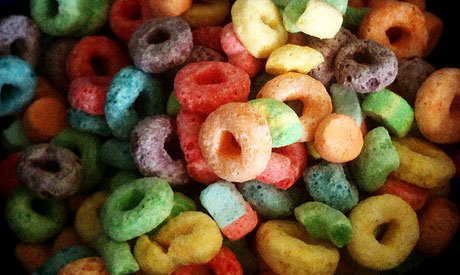
A bowl of breakfast cereal is a common way for many people to start the day, particularly children. Many cereals, including those marketed to children, contain genetically modified (GMO) ingredients, as we mention in our book Label Lessons: Your Guide to a Healthy Shopping Cart.
Soy, corn, sugar beets and canola, or derivatives of them, are commonly found in cereals and the majority of those crops in the U.S. are GMO. Scientific evidence continues to link GMOs and the pesticides and herbicides commonly used on them with severe human health and environmental risks. Organic industry watchdog group, the Cornucopia Institute, found a surprising number of cereals are contaminated with GMO ingredients when they sent samples of various cereals to a lab for testing. The group revealed the results in a report published in 2011.
Cereals marketed as “natural” and enrolled in the Non-GMO Project contained high levels of GMO ingredients, according to the report. Some of those marketed as “natural” contained 100 percent GMO ingredients, including Kashi GoLean, Mother’s Bumpers, Nutritious Living Hi-Lo, and General Mills Kix. There were a few cereals making non-GMO claims that had GMO ingredients, including Whole Foods’ 365 Corn Flakes, which contained more than 50 percent GMO corn despite being enrolled in the Non-GMO Project.
Read more about misleading labels
So, how can you avoid GMO ingredients in your morning cereal? Make sure you buy cereal that is certified organic. As the Cornucopia Institute report states, the “test results underscore the importance of the organic label, which assures consumers that the manufacturer uses only non-genetically engineered ingredients.” Examples of GMO-free cereal include Snackimals and Honest O's Organic from Barbara's, both of which are featured in our Label Lessons e-book. Barbara's recently verified a large number of products in their line to be non-GMO.
At Naturally Savvy we are big label readers, and encourage to you to always read labels, including products that are certified organic. When it comes to cereals, also look for the sugar and fat content. Even if a cereal is certified organic, if it is loaded with sugar it is not healthy.
Photo Credit: Keith Bloomfield




